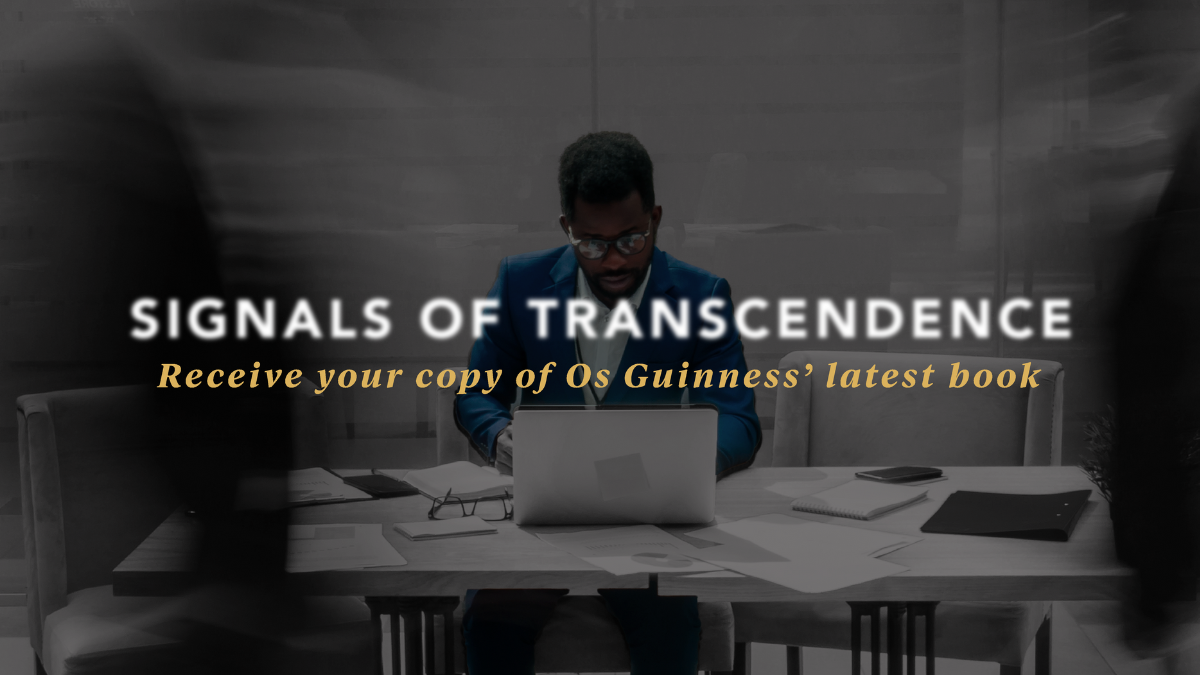

New Book Points to Signals of Transcendence
God can be seen, for those with eyes to see, in everything from the beautiful to the tragic to the mundane.
03/22/23
John Stonestreet and Kasey Leander

Like the prisoners in Plato’s cave, many people, trapped in a shadow world of materialism and consumerism, cannot imagine that reality extends beyond our senses and shallow desire. Blind to the light of reality and the Gospel, they miss how God continues to reveal Himself in the world He has made. God has infused the world with His presence, with signs that point to Him and His love. He can be seen, for those with eyes to see, in everything from the beautiful to the tragic to the mundane.
This premise is at the heart of Os Guinness’ new book, Signals of Transcendence: Listening to the Promptings of Life. In it, he tells stories of how God broke through to those trapped in limited worldviews of secularism and materialism to woo and win some of the most familiar and interesting people to ever join the ranks of believers: C.S. Lewis, Malcolm Muggeridge, Leo Tolstoy, G.K. Chesterton, and others.
In a recent interview with my colleague Shane Morris on the Upstream podcast, Os explained the meaning of the phrase “signals of transcendence.”
Peter Berger had another phrase talking about our modern world. He described it as “a world without windows. …”
We need a massive awakening right across Western civilization. We need the Word and the Spirit to break in on us and to help us understand there’s a far greater reality than a consumer society, and so on, allows us to know.
One of the stories that Os tells in Signals of Transcendence is that of W.H. Auden, the brilliant 20th-century poet.
When he left Oxford a few years after, he was [a] young, left-wing atheist and gay at a time when it was not popular, and he was a hero to people on the left and fought against Franco in the Spanish Civil War.
So, he comes over to America to escape that with his gay partner. And of course, in 1939, there’s no television. So, you have to go to the cinema on a Saturday night to watch the latest round of the documentary news. And unbeknownst to him, the audience in the cinema he went to in the Upper East Side of Manhattan was almost all German in Yorkville.
And one night, he went, and the documentary was on the siege of Poland and Nazi stormtroopers who are bayonetting women and children brutally. But the German audience in the cinema cried out, “Kill them, kill them,” egging on their own fellow countrymen.
And Auden sat there in the darkness, horrified. He says in two minutes his whole worldview was overturned. First, he knew there was radical evil. He always saw humans as basically good—a little better psychology, politics, education, [and] we turn out well. No. He knew humans had evil, but worse. He needed an Absolute to say Hitler was absolutely wrong. Not relatively, not just culturally.
So, he says, “I left the cinema a seeker after an unconditional absolute and met Jesus.” That passion for an Absolute to judge what was absolutely evil was a signal for him.
Our desire for justice is a signal of transcendence. Another is the sense that love should be permanent. To explain this signal, Os tells the story of his grandparents, Whitfield and Jane Guinness.
They were missionaries to China, and … they had an amazing love having gone through the Hellfire of the Boxer Rebellion and nearly died several times. …
I have a Christmas card that my grandfather, then in his 20s, gave to his new wife for their first Christmas. And it just reads simply … “to one who is dearer than life with a love that is stronger than death. …”
You take the pop song “If Love Is Not Forever, What’s Forever For?” for someone who truly loves knows that it’s not some ephemeral motions coming and going—it demands and requires eternity.
According to Os, the signals of transcendence that God has placed in His world are available but are often missed by a generation lost in distraction.
When these things strike us, we’ve got to take the time, think enough, care enough, to really think through what it is, maybe share with a friend and wrestle with them until we come to an answer. In other words, not just brush them off. Interesting experience—on we go. No, no. When life gives us these signals, you want to follow through with them until we have answers deeply satisfactory to the best of our hearts and minds together. …
And I end this book … with that wonderful prayer of Saint Augustine: “You have made us for yourself. And our hearts are restless until they find their rest in you.”
To receive a copy of Os Guinness’ latest book, Signals of Transcendence, make a gift of any amount to the Colson Center. This is an important book for everyone hoping to point people who are lost in a secular world to God. I’d love to send you a copy.
This Breakpoint was co-authored by Kasey Leander. For more resources to live like a Christian in this cultural moment, go to colsoncenter.org.
Have a Follow-up Question?
Up
Next

Related Content

© Copyright 2020, All Rights Reserved.













